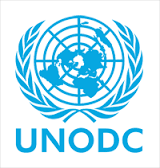VIENNA, 12 November (UN Information Service) – The United Nations Office on Drugs and Crime (UNODC), Afghanistan, Japan and the Russian Federation signed a declaration today, giving an overview of the past achievements and highlighting the new development of the Trilateral Cooperation between UNODC, Japan and Russia to support counter narcotics efforts of the Government of Afghanistan.
The successful partnership, which is contributing to enhancing the interdiction efforts and regional cooperation, has proven to be among good practices under the principle of common and shared responsibility for addressing and countering the world drug problem. This cooperation was initiated in September 2012 with the delivery of counter narcotics training provided to law enforcement officials from Afghanistan and its neighbouring countries of Central Asia, conducted at the All-Russian Advanced Training Institute of the Ministry of Internal Affairs of the Russian Federation, or the “Domodedovo Training Centre” with the financial and technical support of Japan.

At the signing ceremony UNODC Executive Director Yury Fedotov said: “It is a much needed example of cooperation rooted in shared responsibility to address common challenges, and support Afghanistan and the wider region to confront drug threats to security, development and health. We look forward to further advancing UNODC’s work with you through the declaration we are signing today.”
The Deputy Minister of Foreign Affairs of the Russian Federation, Oleg Syromolotov, underlined that “The K9 project received approval by the leaders of Japan and the Russian Federation, which highlights its enduring importance in terms of ensuring stability and security in the Eurasian region.”
Mitsuru Kitano, the Permanent Representative of Japan to the International Organizations in Vienna, said: “The unprecedented trend in Afghanistan calls for greater concerted and strengthened efforts by the international community. The K9 project, to which Japan contributed US$ 1.6 million this year, would greatly contribute to their counter narcotics efforts”.
While Khojesta Fana Ebrahimkhel, the Permanent Representative of Afghanistan to the United Nations in Vienna, highlighted that: “Establishing effective detection tools, such as the highly specialized canine (K9) Unit, will greatly enhance law enforcement interventions and interdiction efforts in Afghanistan. Afghanistan greatly appreciates this generous support.”
This partnership is contributing to the implementation of Resolution 60/9 adopted at the 60th Session of the Commission on Narcotic Drugs (CND) in March 2017, stressing the quick impact and relevance of law enforcement training and reiterating the importance of strengthening the capacities of law enforcement agencies to respond to drug-related threats.
The Trilateral Cooperation is further expanding with the recent launch of the new project on the establishment of a counter narcotics canine (K9) unit in Afghanistan in October 2018. The first activity of the K9 project commenced with a training course for the administrative staff of the future unit to be established in Kabul, which was conducted at the Rostov Dog Training School for Operations and Search Activity of the Ministry of Internal Affairs of the Russian Federation with the financial support of Japan.
Taking into consideration the expansion and consistent commitment of the partners to enhance coordination, oversight and sustainability of the delivered technical assistance, UNODC launched during the 60th Session of the CND, a Database on Law Enforcement Training, which builds on knowledge and capacity developed to monitor data on drug seizures, dismantling of laboratories and arrests made in West and Central Asia. The Database was developed with the financial support of the Russian Federation and Japan.
